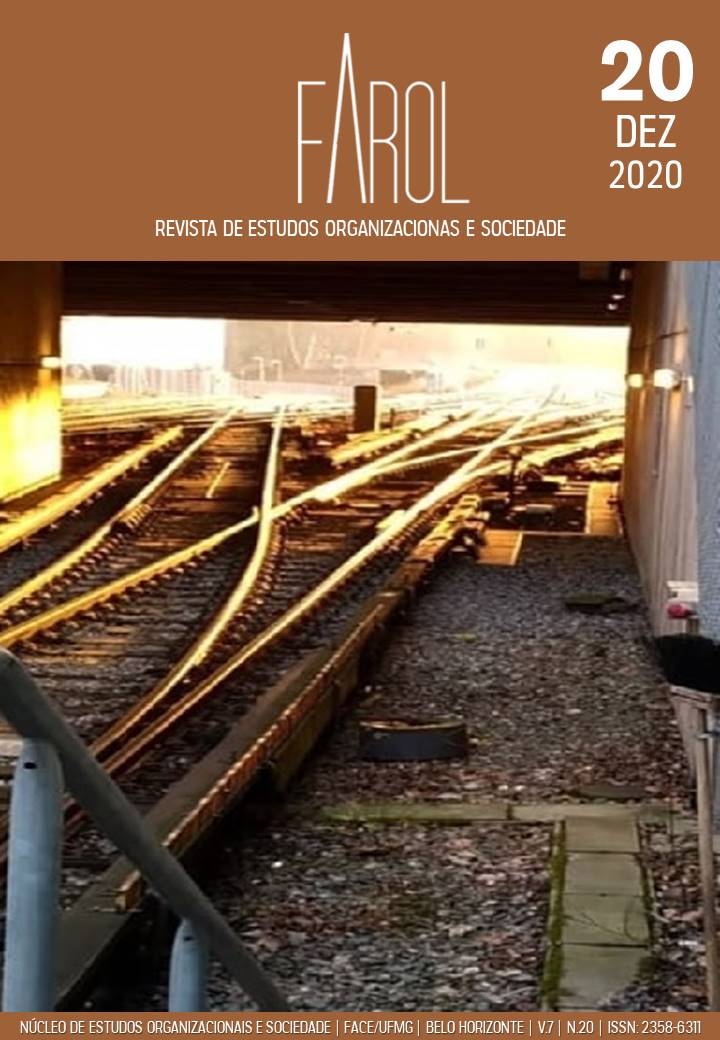MANIFESTO POR UM MUNDO ONDE TODOS TENHAM DIREITO DE RESPIRAR PARA VIVER
DOI:
https://doi.org/10.25113/farol.v7i20.6684Palavras-chave:
Alteridade. Contemporaneidade. Relações Sociais. Precariedade.Resumo
O que é o humano? Quem é considerado como humano? O que qualifica uma relação como social? A análise que segue lança luz sobre o lugar da alteridade no nosso horizonte relacional contemporâneo. A discussão se estende também ao mundo organizacional por este se configurar no espaço onde o humano se torna viável. Esse texto configura-se em um manifesto que preconiza que a existência individual e a noção que temos sobre nós mesmos só são possíveis quando o outro compõe o nosso horizonte relacional. O texto fundamenta sua discussão considerando a existência de uma precariedade estrutural comum a todos os humanos como possibilidade de construção de relações sociais não violentas e de um mundo mais prismático e menos autoritário.
Referências
Arendt, h. (2016). A condição humana (12a ed). Rio de Janeiro: Forense Universitária.
Arendt, H. (2012). Origens do totalitarismo. São Paulo: Companhia das Letras.
Arendt, H. (2003). Eichmann em Jerusalém: um relato sobre a banalidade do mal. São Paulo: Companhia das Letras.
Butler, J. (2019). Vida precária: os poderes do luto e da violência. Belo Horizonte: Autêntica.
Cenci, A. V. & Casagranda, E. A. (2018). Alteridade, ação e educação em Hannah Arendt. Cadernos de Pesquisa, 48(16), 172-191.
Elias, N. (1994). A sociedade dos indivíduos. Rio de Janeiro: Jorge Zahar.
@mariofellipesociologo. (2020, 4, junho). Amor em tempos de aplicativo: entrevista com a antropóloga Larissa Pelúcio. Vídeo. Instagram. https://www.instagram.com/tv/CBB3SX-FkPgN_4JbCLdgS4McKYjGXyRPgTJSDI0/?igshid=tr33j2vxf549.
Downloads
Publicado
Edição
Seção
Licença
Copyright (c) 2020 Mário Fellipe Fernandes

Este trabalho está licenciado sob uma licença Creative Commons Attribution 4.0 International License.
Assume-se que em qualquer das modalidades de contribuições aceitas pela Farol – Revista de Estudos Organizacionais e Sociedade, ao submeter um trabalho, o(s) autor(es) se reconhece(m) como detentor(es) do direito autoral sobre ele e autoriza(m) seu livre uso pelos leitores, podendo ser, além de lido, baixado, copiado, distribuído, adaptado e impresso, desde que seja atribuído o devido crédito pela criação original. Em caso de aprovação do trabalho para publicação, os direitos autorais (inclusive os direitos de tradução) são exclusivamente do(s) autor(es).
Os autores devem concordar com os seguintes termos relativos aos Direitos Autorais:
a. Autores mantém os direitos autorais e concedem à revista o direito de primeira publicação, com o trabalho simultaneamente licenciado sob a Licença Creative Commons Attribution que permite o compartilhamento do trabalho com reconhecimento da autoria e publicação inicial nesta revista.
b. Autores têm autorização para assumir contratos adicionais separadamente, para distribuição não-exclusiva da versão do trabalho publicada nesta revista (ex.: publicar em repositório institucional ou como capítulo de livro), com reconhecimento de autoria e publicação inicial nesta revista.
c. Autores têm permissão e são estimulados a publicar e distribuir seu trabalho online (ex.: em repositórios institucionais ou na sua página pessoal) a qualquer ponto antes ou durante o processo editorial, já que isso pode gerar alterações produtivas, bem como aumentar o impacto e a citação do trabalho publicado (Veja O Efeito do Acesso Livre).

